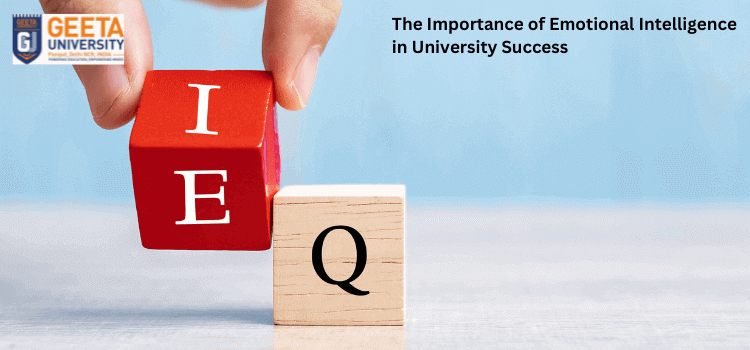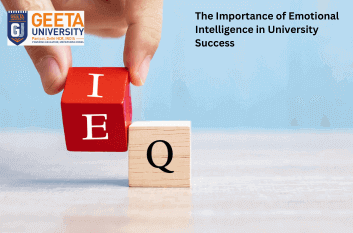The Power of Emotional Intelligence: Unlocking University Success – Geeta University
Uncategorized Best Career Options in geeta university, best college, best diploma university in haryana, Best engineering College in Haryana, best Law college in Haryana, best mba college in haryana, best MCA college in haryana, Best University for BCA in Haryana, Best University in Haryana, Geeta University, Uncategorized
The Power of Emotional Intelligence: Unlocking University Success – Geeta University
Emotional intelligence, often referred to as EQ, plays a vital role in achieving success not only in academics but also in various aspects of university life. It encompasses the ability to recognize, understand, and manage emotions, both in oneself and in others. Developing and harnessing emotional intelligence can enhance interpersonal relationships, improve communication, and contribute to overall well-being. In this blog, we will explore the significance of emotional intelligence and how it can positively impact university students.
Understanding Emotional Intelligence :
Emotional intelligence refers to the capacity to recognize and manage emotions effectively. It involves being aware of one’s own emotions, understanding the emotions of others, and using this knowledge to navigate social interactions and make informed decisions. Emotional intelligence encompasses self-awareness, self-regulation, empathy, motivation, and social skills.
Enhancing Interpersonal Relationships :
Emotional intelligence plays a crucial role in building strong and healthy relationships with peers, professors, and other members of the university community. It helps in understanding and empathizing with others, resolving conflicts, and effectively communicating thoughts and feelings. By developing emotional intelligence, students can foster positive connections, collaborate effectively, and create a supportive network.
Managing Stress and Overcoming Challenges :
University life often presents various challenges, such as academic pressures, deadlines, and personal responsibilities. Emotional intelligence equips students with the ability to manage stress, adapt to changes, and persevere through difficult times. By understanding and regulating their emotions, students can develop resilience, maintain a positive mindset, and effectively cope with the demands of university life.
Effective Decision-Making :
Emotional intelligence influences decision-making by considering not only logical factors but also emotions and intuition. It helps students evaluate situations from different perspectives, assess the impact of decisions on themselves and others, and make informed choices. By harnessing emotional intelligence, students can make decisions that align with their values, goals, and overall well-being.
Cultivating Leadership Skills :
Emotional intelligence is closely linked to effective leadership. Developing emotional intelligence can enhance leadership qualities such as empathy, communication, influence, and conflict resolution. By honing these skills, students can become successful leaders who inspire and motivate others, whether in student organizations, group projects, or future professional roles.
Conclusion :
Emotional intelligence is a critical skillset that contributes to success in various aspects of university life. By developing emotional intelligence, students can build meaningful relationships, effectively manage stress, make informed decisions, and cultivate leadership abilities. It is a skill that can be learned and enhanced through self-reflection, practice, and a willingness to understand and connect with others. Prioritizing the development of emotional intelligence can lead to a more fulfilling and successful university experience, as well as positively impact personal and professional growth beyond graduation.
If you like it, then keep reading the top university in Delhi, NCR viz. Geeta University’s blogs!!!
- By Garvita Aggarwal
Related Posts
Forensic Biometrics
Ankit Kumar, Assistant Professor Sciences, Geeta University, Panipat With a growingly connected world, wherein digital trails mingle with physical presence, it has become imperative to accurately and reliably identify people. Forensic biometrics, as a scientific discipline that combines the principles of biology, technology, and law, is at the forefront of this significant endeavor. It involves the use of distinctive biological characteristics to distinguish individuals for legal reasons, contributing increasingly to criminal investigations, security, and identity management. This blog goes in-depth into the multidisciplinary arena of forensic
AI-Driven Protein Folding and Drug Structure Prediction
Introduction to Protein Folding and Drug Discovery Protein folding is a highly intricate process by which linear chains of amino acids transform into specific three-dimensional structures necessary for their biological function. The precise way a protein folds governs its ability

Neuroplasticity
Introduction Neuroplasticity is a concept that has gained traction in recent decades, but its roots lie in early neuroscience research. Although the term itself was coined in the mid-20th century, his understanding of the brain’s ability to change and adapt



